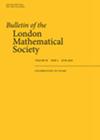Mixed L p $L^p$ estimates for transforms of noncommutative martingales
IF 0.8
3区 数学
Q2 MATHEMATICS
引用次数: 0
Abstract
Let . The paper is devoted to the study of estimates for transforms of noncommutative martingales, under the assumption that the transforming sequence takes values in , . This goes beyond the usual context of and studied so far in the literature. The obtained constants are of optimal order at the endpoints, in addition the approach allows to obtain sharp values in the range . The proof rests on real interpolation-type arguments for martingale transforms, which are of independent interest.
求助全文
约1分钟内获得全文
求助全文
来源期刊
CiteScore
1.90
自引率
0.00%
发文量
198
审稿时长
4-8 weeks
期刊介绍:
Published by Oxford University Press prior to January 2017: http://blms.oxfordjournals.org/

 求助内容:
求助内容: 应助结果提醒方式:
应助结果提醒方式:


